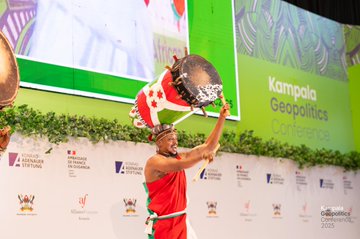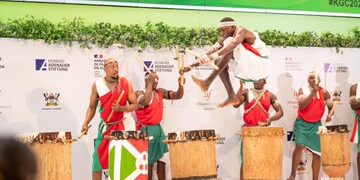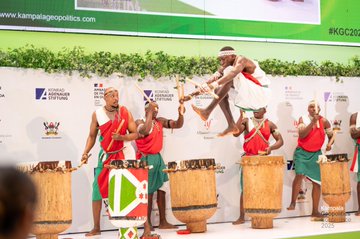The rhythms of Burundi rang out in Kampala on Day One of the Kampala Geopolitics Conference, as a troupe of traditional drummers transported audiences to the rolling hills of Bujumbura through a cultural performance that was both electric and deeply grounding.
Held at the Central Teaching Facility Auditorium at Makerere University, the performance was more than entertainment — it was an immersive cultural experience that reminded participants of the unifying power of music, especially in the context of regional conversations on politics, identity, and cooperation.

As the sun set, the energy didn’t fade—it transformed. The evening was nothing short of spectacular, with show-stopping performances from Burundi’s Umurisho Troupe and Uganda’s very own musical artist, dancer, singer and songwriter, Nakiyingi Veronica Lugya, professionally known as Vinka, who fed the audience a myriad of her hit songs.
The fusion of traditional drumming and modern rhythms was a powerful reminder that art and culture are just as central to diplomacy and development as policy and politics.

The thunderous sound of the Ingoma — the traditional Burundian drum — filled the room as the drummers, dressed in vibrant red, white, and green, moved in choreographed rhythm. Each beat seemed to echo Burundi’s heritage, storytelling traditions, and spirit of resilience.
“For a moment, we weren’t just in Kampala — we were standing on the green hills of Burundi,” said one of the conference attendees. “The energy, the pride, the tradition — it was powerful.”
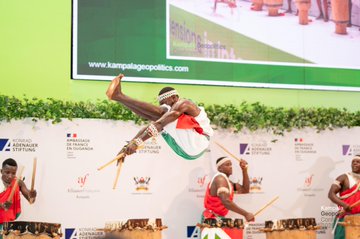
The drumming, often considered sacred in Burundian culture, is not merely performance art. It holds spiritual, political, and social meaning — used in royal ceremonies, communal celebrations, and moments of national significance.
The performance at the conference reminded many of the need to preserve such traditions even as the continent grapples with modern political challenges.

In his remarks, Éric Touzé, Director of Alliance Française Kampala, emphasised the Alliance Française’s dual role as a language hub and a cultural beacon. “Culture is not just entertainment — it’s a form of geopolitics. Music, art, and language shape how we relate to each other, challenge ideas, and build common ground.”
From the very start, the day was electric, packed with thought-provoking panels, bold perspectives, and meaningful dialogue that lit up the stage. Experts, scholars, and changemakers explored Africa’s geopolitical future in an atmosphere charged with intellectual curiosity and collaboration.
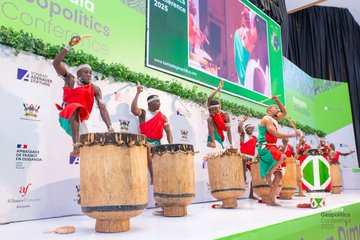
The Burundian Drummers’ presence also set the tone for a broader conversation on Africa’s soft power and the role of arts, culture, and heritage in diplomacy. With the conference addressing heavy topics such as global governance, peacekeeping, and economic transformation, this performance offered a moment of collective joy and reflection.
The Drumming Tradition of Burundi – “Ingoma”
The ancient drumming tradition in Burundi, known as “ingoma,” dates back to the 17th century and is deeply rooted in the country’s royal heritage. Drums symbolized the king’s power, with the phrase “ascended the drum” signifying a monarch’s enthronement.
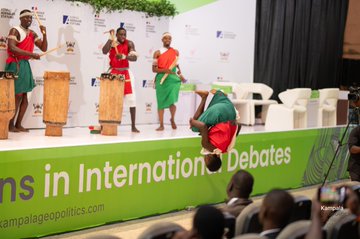
Sacred drums like Ruciteme and Murimirwa are preserved in Gishora, and were traditionally made from the umuvugaangoma tree—“the tree that makes the drum talk.”
The Royal Drummers of Burundi—also called The Master Drummers—are a renowned percussion ensemble whose performances have historically accompanied royal ceremonies such as coronations, funerals, and births. Their sacred drums (karyenda) represent the king, fertility, and renewal.
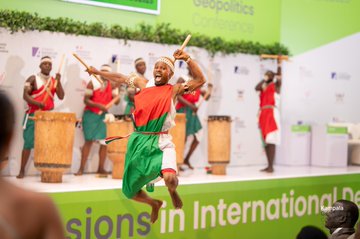
The drumming style, passed from father to son, features multiple drums: Inkiranya (central drum), Amashako (steady beat) and Ibishikiso (rhythmic responses). During performances, drummers balance heavy drums on their heads while dancing, playing, and singing in a seamless, rotating rhythm.
Since the 1960s, they have toured globally, influencing world music and inspiring events like the WOMAD festival. Their sounds have been featured in films and on albums by artists such as Joni Mitchell and Echo & the Bunnymen.
